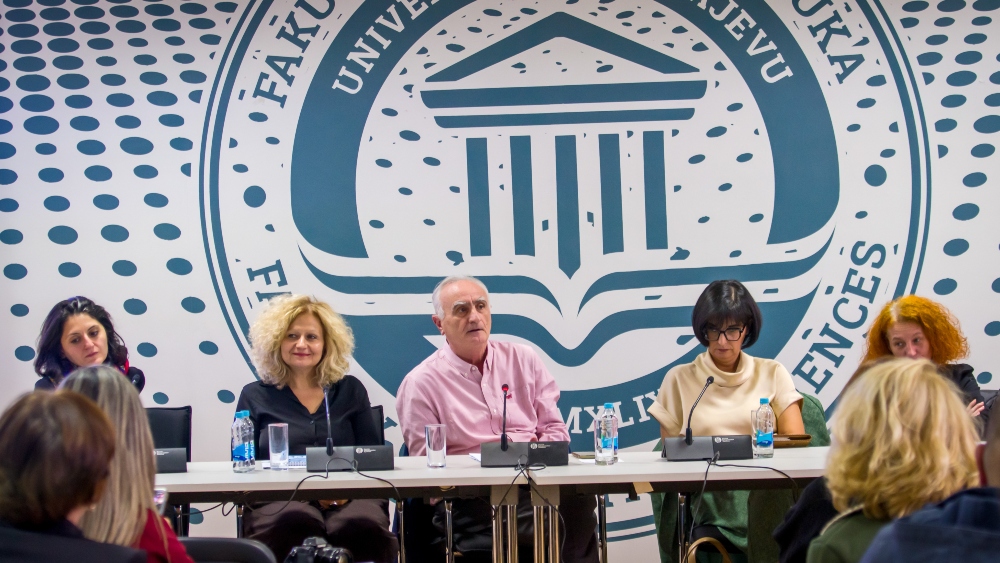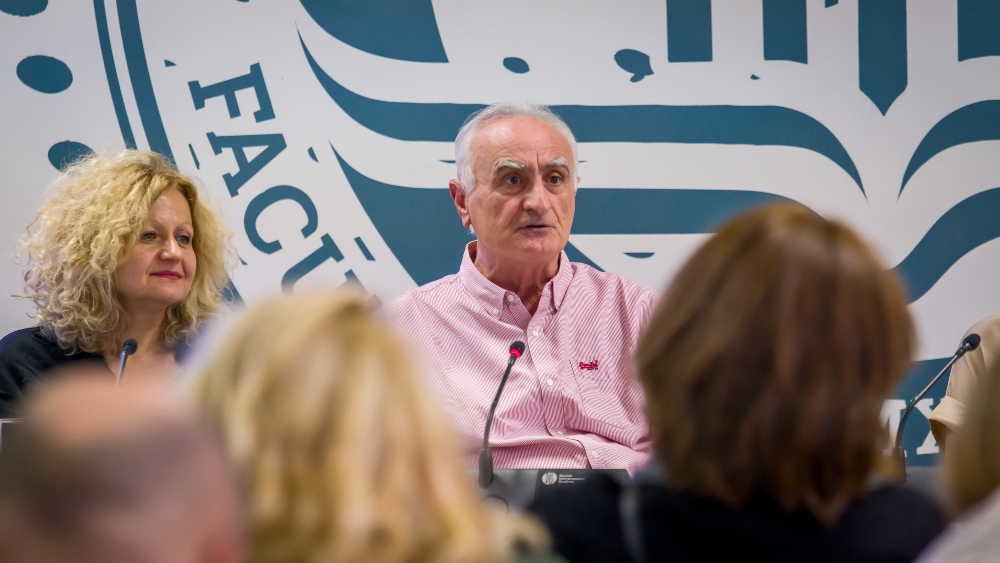The Media Landscape of the Western Balkans and Turkey: Stuck in Transition

The Media Landscape of the Western Balkans and Turkey: Stuck in Transition
20/10/2025
If journalism is to survive, it must not only defend itself legally and through unions, but also revolutionarily redefine its role, format, and economic foundation – making the public interest, rather than profit or political influence, its central goal. This is particularly evident in Southeast Europe and Turkey, where the crisis of journalism is further complicated by a failed transition and deep economic instability.
Photo: SEENPM
These issues were in focus at the panel “Future of Journalism in the Western Balkans and Turkey – What Future?”, held as part of the international conference Our Media, organized by the South East European Network for Professionalization of Media (SEENPM) and Mediacentar Sarajevo.
The panel gathered experts from various countries and fields, from journalism unions to academia. Among the participants were Remzi Lani (Albania), Sinem Aydinli (Turkey), Žaneta Trajkoska (North Macedonia), Helena Milinković (Slovenia) and Lejla Turčilo (Bosnia and Herzegovina). Their shared conclusion was clear: the media have found themselves in a counter-revolution where noise, not argument, is the main weapon.
Political Pressure and the Collapse of Freedom: Turkey as a Paradigm
The media situation in Turkey served as a dramatic introduction to what, in a milder form, is spreading across the region: a systemic suppression of freedom of expression through economic, legal, and digital means.
Media researcher Sinem Aydinli stated that journalism in Turkey is “under siege by powerful political and economic pressures,” with the profession’s economic sustainability weakened and public trust in the media declining year after year.

Aydinli provided numerous examples illustrating the repression. Journalists are often prosecuted on charges of “terrorist propaganda” or “membership in terrorist organizations,” and legal tools such as Article 301, which criminalizes “publicly insulting the Turkish nation and the Republic of Turkey,” are often used. Even laws on public gatherings and demonstrations are increasingly applied against journalists. An illustrative example is the case when, following the arrest of Istanbul’s mayor, journalists, particularly photojournalists, who documented police violence were detained.
Beyond direct pressure, digital control poses another serious issue. Aydinli noted that Google’s algorithms promote pro-government media in 89% of cases, drastically reducing the visibility of independent outlets. Regulatory bodies such as RTÜK (Radio and Television Supreme Council) selectively penalize independent media, while the public broadcaster TRT “simply amplifies the official government line.”
The result is an ethical collapse. Aydinli quoted independent ombudsman Faruk Bildirici, who referred to the case of the murder of an eight-year-old girl. The media at the time “raced to publish sensationalist and unverified claims,” which led the public to believe that “the entire family was guilty.” That shows how the media in Turkey, in pursuit of ratings, “abandoned ethics and verification.”
Economic Paralysis and the Silent Departure of Youth
The economic model of journalism in the Western Balkans shows the same symptoms, but with a particular focus on the poverty of the profession and the exodus of young people.
Lejla Turčilo, a professor at the Faculty of Political Science at the University of Sarajevo, speaking about the future of journalism and education, revealed that students entering the program ask two key questions: “Will journalism survive by the time we graduate?” and “What’s in it for me?”
Turčilo pointed to alarming figures for Bosnia and Herzegovina: net salaries for journalists range from 600 BAM (€305) to 1,700 BAM (€865). The lowest salary covers only 25 percent of the consumer basket, while the highest reaches just 57 percent.
“All those issues I mentioned theoretically – political pressures, the economic situation, poor working conditions, in Bosnia and Herzegovina they’re multiplied by ten,” Turčilo summarized.
Low incomes, combined with the high risks of the profession and poor working conditions, make journalism a “poor profession” that offers no prospects for young people. Research in Turkey has shown a similar trend, where students avoid journalism because it is “criminalized, too risky, and too poorly paid.” In that context, Turčilo warned that generations of journalists who remember the “Before Google (BG) times” are “trying to fit new things into old boxes,” while younger audiences live in entirely new digital conditions, following bloggers, influencers, and podcasts.
“The Sleeping Beauty” and the Revolutionary Imperative
As the economy collapses and political pressure grows, the media in the region remain passive, waiting, in the words of Zaneta Trajkoska from North Macedonia, to be “corrupted and clientelized.”
Trajkoska, who works as a director, science advisor, and professor at the Institute of Communication Studies in Skopje, described the media scene in North Macedonia with a striking analogy: “The media situation […] is like in a dream – ‘a sleeping beauty.’ They are just waiting.”
Such passivity has direct consequences: the media have surrendered their role in shaping the public agenda to political parties, which today “have their own editorial offices inside, their own social media, podcasts.” Political actors have “completely bypassed journalists” and taken over their role in society. Because of this, Trajkoska called for a radical turnaround.
“I think the future of journalism could survive in some form as we know it today if we do a little bit more – not an evolutionary, but a revolutionary approach.”
The key to that revolution, Trajkoska argues, lies in breaking out of the “bubbles” in which academia, civil society, and the media have long operated. She calls for urgent networking: “We need to connect – without money, without donors.”
Resistance and Learning from the Public: A Lesson from Slovenia
In the fight against the political takeover of public media, the experience of Helena Milinković from RTV Slovenia offers a rare example of successful, two-year union resistance.
After Janez Janša’s government, following Orbán’s example, attempted to take over the public broadcaster in 2020, journalists and media workers “did not sleep.”
The central idea was that journalists must stop fighting alone and mobilize a broader network, including lawyers, academia, and civil society, because “no one can survive alone.” Milinković warned that “the danger is growing” and that journalists have no choice but to work amid “increasing harassment, intimidation, surveillance, and threats to their lives and livelihoods.” The key message of the union resistance was: do not underestimate the public.

“We always think we are the smartest. No, they know a lot. Don’t just talk about your problem – find their problem within your problem so they can identify with it.” The strategy paid off: in the referendum in Slovenia, 70 percent of people voted in favor of the RTV Slovenia Act – a result achieved by going beyond the capital and listening to the citizens. Their tactic of resistance was: “We are like mushrooms. We are everywhere. And when they try to silence us, we grow somewhere else. They cannot silence us all at once.”
The Struggle for a Young Audience and a New Humanism
The last line of defense for journalism lies in its ability to adapt to an audience whose attention span is shrinking to a minimum.
Helena Milinković pointed out that the attention span among young people has drastically decreased. “When I was a student, the attention span was around ten seconds. Now it’s about one and a half seconds.” This change requires a rethink of media formats, because if the media continue in the “old-fashioned way,” journalism will become “just another propaganda machine in the future.”
In his closing remarks, Remzi Lani, director of the Albanian Media Institute, offered a broader, philosophical analysis of the regional crisis, concluding that the Western Balkan media landscape is “stuck in transition” and that we are currently facing a “counterrevolution.”
Lani contextualized the current conflict as one between “New Humanism versus Old Humanism.” The Old Humanism, from Descartes to the Enlightenment, sought to free humankind from theology. “The New Humanism faces the challenge of the individual human being versus technology.”
This means that the struggle of journalism is no longer only against politicians and tycoons, but also against the “unpredictability” of algorithms, censorship, and technology that is reshaping human attention itself.
In the context of the Future of Media in the Western Balkans and Turkey study, conducted by the SEENPM, which highlights the lack of sustainable business models and the dangerous ties between the media and those in power, the panel’s conclusions emerge as a clear call to action.

The regional program “Our Media: A civil society action to generate media literacy and activism, counter polarisation and promote dialogue” is implemented with the financial support of the European Union by partner organizations SEENPM, Albanian Media Institute, Mediacentar Sarajevo, Press Council of Kosovo, Montenegrin Media Institute, Macedonian Institute for Media, Novi Sad School of Journalism, Peace Institute and Bianet.
This article was produced with the financial support of the European Union. Its contents are the sole responsibility of SEENPM and do not necessarily reflect the views of the European Union.
Co-funded by:





